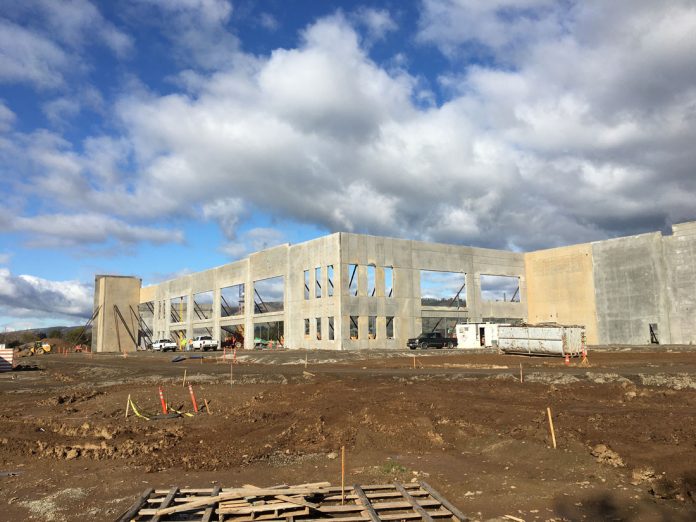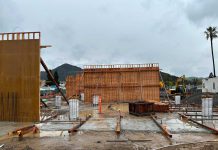City officials and the organizers of a citizens’ initiative to prohibit new fulfillment, sorting and distribution centers in Morgan Hill—a goal shared by city council members and thousands of local residents—will try for another 30 days to agree to a revised compromise ordinance.
If they can’t reach an agreement, the Morgan Hill Responsible Growth Coalition’s initiative will likely be placed on the 2022 election ballot. A slim majority of city council members have already declined to adopt the initiative outright, largely due to its potential limitations on the future plans for existing businesses that might want to expand in Morgan Hill.
At the March 3 meeting, the city council unanimously agreed to certify the MHRGC’s petition for the initiative to change the city’s zoning regulations, which organizers had been circulating since September 2020. The petition had been signed by more than 3,500 Morgan Hill voters. The coalition needed at least 10 percent—or 2,624—of the city’s registered voters to sign the petition in order to gain certification. City Clerk Michelle Bigelow reported to the council March 3 that county elections officials had verified a sufficient number of signatures.
With the initiative petition certified, by state election law the council is required within 30 days to adopt the initiative as a city ordinance or agree to place the question on the 2022 ballot. On March 3, the council voted 3-2 to have city staff and a consultant conduct an impact study of the MHRGC initiative over the next 30 days.
At the April 7 meeting, the council will discuss the results of the impact study before deciding whether to adopt the initiative or send it to the voters.
The council’s 3-2 vote also directed city staff over the next 30 days to resume discussions with the lead proponents of the MHRGC to try to reach a compromise on a revised ordinance that would accomplish the shared goal of prohibiting fulfillment or distribution centers in Morgan Hill. Under state election law, the proponents of the MHRGC initiative still have time to withdraw it from consideration as an ordinance.
Councilmembers Gino Borgioli and Rene Spring voted against the 30-day delay, and instead wanted the council to adopt the MHRGC initiative at the March 3 meeting.
Mayor Rich Constantine and Councilmembers Yvonne Martinez Beltran and John McKay voted in favor of the 30-day delay and impact report, on a motion made by Martinez Beltran.
Her motion was a “substitute” to a motion previously made by Borgioli, to adopt the MHRGC initiative immediately.
MHRGC members have been collecting signatures for their initiative since September. Proponents of the initiative are Joe Baranaowski, Rick Kent and Andrew Plant. The ordinance would prohibit new construction of industrial buildings in Morgan Hill that meet certain criteria befitting of a likely distribution center: greater than 75,000 square feet in size; ceilings higher than 24 feet over more than 25 percent or more of the building’s floor plan; and more than one dock door per 25,000 square feet of proposed building space.
Councilmembers have stated at numerous meetings that they are also opposed to distribution centers in Morgan Hill, and city officials have responded to the increasing public pressure by proposing and implementing alternatives to the MHRGC initiative. In October, the council unanimously approved a prohibition on all distribution facilities, including those known as “last mile delivery” facilities or “parcel hubs.”
In February, the council kept the public discussion going with a workshop on additional methods to regulate distribution centers.
The common arguments against fulfillment centers include the increased truck traffic, noise and environmental impacts that often come with them. The distribution facilities also do not provide the quality or quantity of jobs—nor the tax revenue—that other types of industrial developers or manufacturers would bring to the community, opponents argue.
Both the October ordinance approved by the council and the MHRGC initiative require planning commission review at a public hearing for any proposal in the city limits defined as a “significant project.” In the city’s ordinance, these projects are defined as any commercial development larger than 75,000 square feet; 40 feet high or taller; or a residential project of 100 units or more.
At the March 3 meeting, Morgan Hill Development Services Director explained that while the MHRGC initiative bans fulfillment centers by the size and type of proposed buildings, the city’s ordinance prohibits them by regulating the use of a property. The potential consequences of that difference is that some existing industrial buildings in Morgan Hill—including Specialized, Sunbasket and NxEdge headquarters—would be classified as fulfillment centers under the initiative, even though those properties are not used for distribution activity.
The initiative could limit such companies from expanding their local operations in the future, some councilmembers feared.
“The thing that is so maddening about this is, both sides want the exact same thing,” Constantine said. “The city is concerned about our current businesses and attracting new business. That’s where we have to be a little more cautious.”
More than 20 members of the public spoke during public comment at the March 3 meeting. Most were members of the MHRGC who asked the council to adopt the initiative that evening.
“Allowing large areas of industrial land to be used to construct buildings that have all the characteristics of a distribution center and then to try and restrict use after the fact is not efficient,” says an email from MHRGC members Baranowski and Miguel Jimenez to city officials. “Not only will it crowd out investment from other industries that the community and our city council desire, such as life sciences and advanced manufacturing, but it will also prevent local business like Paramit from expanding.”
Rick Kent, one of the initiative proponents, is Chief Financial Officer for Paramit.
Some councilmembers aren’t hopeful that the city will be able to convince MHRGC to withdraw the initiative in 30 days. Borgioli said city staff and initiative supporters have been in “almost constant” communication over the last three months, but no compromise has been reached.
City Manager Christina Turner wrote in a March 3 email to Baranowoski and Jimenez that city officials are “sad and disappointed to hear that you feel compelled to ask the council to adopt the initiative at tonight’s meeting.” Her email argued that the initiative is “confusing” and would allow some distribution uses that are currently prohibited by the city.
Spring said during the meeting that if the initiative goes to the voters, it will likely pass. “The difference in what we have now and what the initiative proposes is not that huge,” Spring said. “It makes sense to me (that) we should try to prevent buildings that cause uses that we don’t want in our city.”
If the MHRGC initiative goes to the voters, the city’s cost for the election could be $60,000 or more, based on costs in November 2020, according to city staff.








